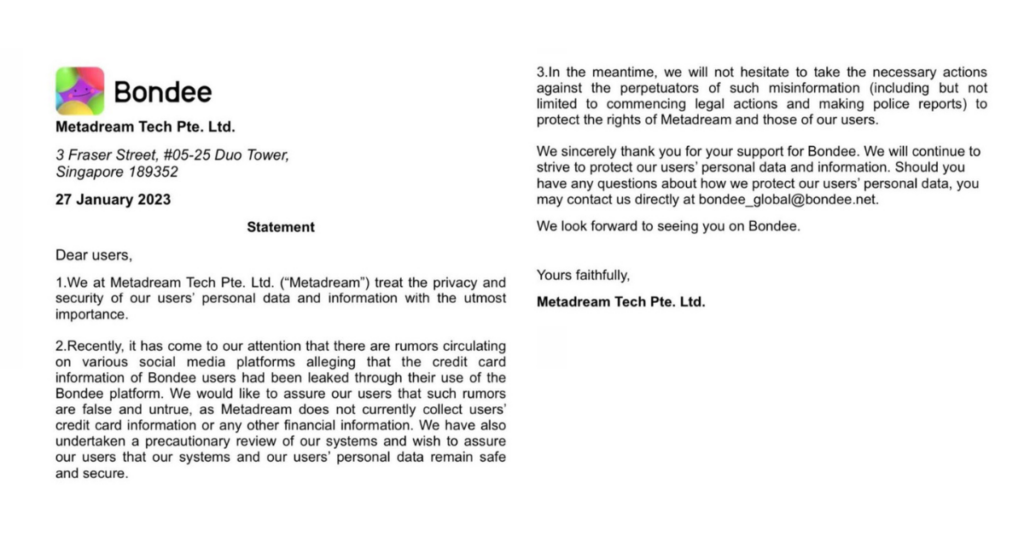Estimated reading time: 5 minutes
Bondee is a mobile app catered to the Gen Z audience with the tagline “Embrace your virtual self.” The app was all the rage at the beginning of 2023, with numerous people sharing their Bondee profiles on various social media platforms and inviting their peers to join. The app quickly rose to fame but lasted less time than its developers had hoped. So, what happened to Bondee?
Table of contents
A Brief Background of Bondee
The Bondee app is a virtual space to hang out with friends; the more friends you have, the larger your space grows. Players who participated in the trend could also customize their avatars and spaces. The mobile application’s website states that the app intends to help users experience living their best digital lives with their closest friends. “Live with your best friends. Share moments, experience new places together, and hang out no matter where you are in the world.”
What Country is Bondee From?
The app is originally from a tech startup based in Singapore named Metadream. The organization emphasized following all security measures while adhering to its regional data regulations. Metadream shares its vision of aiming to connect its users, merging virtual and real, weaving the past, present, and future, curating new social, expressive, and life experiences, and unleashing unlimited creativity and exploration of one’s individuality and the world.

Launch and Initial Success
Upon its release, Bondee garnered two million App Store downloads in just two weeks and appeared to be a competitor to watch out for on social media platforms. Many users found the mobile application nostalgic due to its resemblance to early 2000s social interaction platforms like IMVU and Club Penguin.
What appealed the most to its target market was that it showcased various Y2K (Year 2000) concepts, from the avatar’s fashion to the decoration and customization of rooms or spaces. Numerous Asian countries, including the Philippines, Thailand, Japan, South Korea, and Malaysia, topped the app downloads.
Numerous users initially enjoyed the app due to its features of socializing with friends through avatars and doing virtual activities like camping, swinging, dancing, sailing, and more. The app featured the ability to visit your friends’ spaces and leave each other with heartfelt notes.

Challenges Faced by Bondee
Just as fast as Bondee downloads and popularity rose, it fell off just as quickly. In just a few weeks of being in the mobile application market, the app faced numerous serious allegations from users. They claimed that the application leaked their credit card information after noticing irregular activities in their cards after downloading Bondee.
Due to these serious allegations, the company behind the application had to release an official statement sharing that their users’ private information is safe. The company shared that it doesn’t collect credit card data or other financial information.

Although Bondee was able to clear their name regarding these allegations, more was needed to make users stay. Individuals who downloaded the Bondee app felt there needed to be more features to take up storage space.
The 3D and customization options were fun, but users found these needed more reasons to remain in the app, with various social media platforms available. From the users’ point of view, they wanted an app that allowed them to communicate and socialize with their peers in new ways. Numerous apps already serve their purpose by allowing people to socialize remotely.
Is Bondee an NFT App?
The application was marketed as more than just a metaverse application and social media platform for users. Bondee was originally planned to integrate crypto and non-fungible tokens (NFT) features. NFTs are essentially digital assets that are based on blockchain technology. These are digital files that people invest in to buy, sell, and trade.
What happened to Bondee that led to its downfall was its NFT integration, since the app was originally marketed as a social media platform. However, users then began to find the app’s privacy policies, which included:
“You can create a blockchain-based wallet on the public blockchain within the platform, purchase B-Beans by using fiat currency; and then use such B-Beans to purchase NFT products publicly available on the Platform for yourself or your friend. Your NFT products will be restored in your blockchain-based wallet using blockchain technology. We will collect data generated during the purchases above, including wallet balance, B-Beans order information, and NFT order information. Please note that your wallet mnemonics phrase, private key, wallet password, and other private data will only be stored on your local device, and we are not able to access such data.”
Bottom Line
What happened to Bondee was certainly unfortunate. While initially embraced by a large user base, negative publicity has led many to uninstall the app from their smartphones. Bondee’s case highlights the importance of understanding user preferences and addressing potential privacy issues when introducing new technologies in the rapidly evolving landscape of mobile applications. In essence, the combination of privacy concerns, insufficient features, and a misalignment with user expectations regarding NFT integration led to Bondee’s downfall following its rose to fame.
Sources: (1), (2), (3), (4), (5), (6)
Also Read: The Rose Parade 2024: A Celebratory Showcase of Music, Tradition, and Unity

Leave a Reply